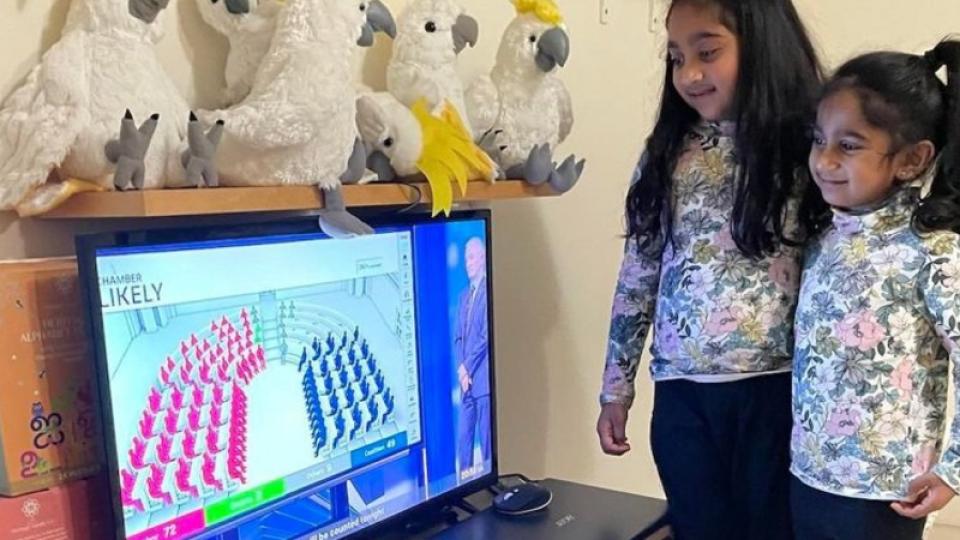Labor has no right to be ‘proud’ of Tamil family's return to Biloela

The Murugappan family has become the human face of Australia’s cruel, punitive refugee policy.
Tamil asylum seekers Nades, Priya and their two children, Kopika and Tharnicaa have suffered the whole gamut of temporary visas, bridging visas, attempted deportation, offshore detention and, most recently, community detention in Western Australia.
Priya and Nades came to Australia separately by boat in 2012 and 2013. Both fled the aftermath of the decades-long civil war in Sri Lanka that came to a head in 2009.
That year, while the world looked the other way, the Sri Lankan government waged a systematic assault on Sri Lanka’s Tamils that lasted a relentless five months. An estimated 40,000–70,000 Tamils were killed; credible estimates put the figure at twice that. Over 26 years of civil war, an estimated 900,000 Tamils were displaced.
The United Nations special rapporteur on counterterrorism and human rights, following a visit in July 2017, reported that Sri Lankan security forces routinely used torture and this continues despite claims of reform. Human Rights Watch reported in 2018 on the military occupation’s “cruel legacy” on Tamil civilian life in the North and East of the island.
This was why Priya and Nades sought asylum.
Nades, like many Tamil youth, was recruited as a child soldier to the Tamil Tigers during the civil war. Before meeting Nades, Priya watched her former fiancé burned alive, along with five other Tamil men.
Anyone with an ounce of humanity would consider this adequate reason to seek asylum.
Instead, Labor and Coalition governments have locked people up indefinitely in offshore prisons, refused to settle anyone arriving by boat and, under Operation Sovereign Borders, turned back asylum seeker boats.
We are told this is about “saving lives at sea” and putting “people smugglers” out of business. We are told that people arriving by boat and seeking asylum is “illegal”.
But the breaches in law are being carried out by government. Australia is a signatory to the 1951 UN Refugee Convention, which recognises that refugees often need to enter a country without permission, or with false documents, to obtain protection.
Under Article 31, signatories cannot punish refugees for entering or living without permission, or unnecessarily restrict their freedom of movement. Further, the convention states that refugees cannot be returned to a place where they may be persecuted. This principle is known as non-refoulement.
The former Coalition government insisted it was safe for Tamils to return to Sri Lanka. The “turn-back” policy means that some asylum seekers from Sri Lanka, who have attempted to reach our shores, have had their boats intercepted and they have been taken prisoner by the Australian Navy. The navy has sunk their boats and forcibly returned them to the very regime they were fleeing.
Proving its commitment to Operation Sovereign Borders, the new Labor government announced after two days in office that it had instructed a boat of Sri Lankan asylum seekers to be turned back.
There was little said about the 40 asylum seekers who were being forcibly returned to the regime they were trying to escape. The media outrage focused on the outgoing Morrison government deciding to break convention and publicise the boat turn-back on election day.
The text to voters was craven opportunism, grounded in racism.
We are thrilled that Priya and Nades and their two children can return to Biloela in Queensland but we must keep the pressure on Labor. As Home to Bilo campaigner Angela Fredericks said, this family are not safe until they have permanent residency.
Interim home affairs minister Jim Chalmers said the family would “reside lawfully in the community” while they work to resolve their immigration status. “This decision” he said, “will allow them to get ‘home to Bilo’, a big-hearted and welcoming Queensland town that has embraced this beautiful family".
Prime Minister Anthony Albanese is reported to have said he was “proud” to describe the family’s return to Biloela. Frankly, he has no right to be.
The family is returning to a new environment of uncertainty, under the cloud of a temporary bridging visa. They must be given permanent residency. It can be done, as has so often been pointed out, at the stroke of a pen.
While Labor seeks to ride the wave of sympathy for the Murugappan family, it has been careful not to give confidence to others seeking permanency that the road is guaranteed. It keeps reiterating its commitment to Operation Sovereign Borders.
If the Murugappan family happened to be seeking safety today on a boat, Albanese would be forcibly returning them to Sri Lanka.
It is impossible to have a humane asylum seeker policy based on turn-backs and a rejection of Australia’s obligations under the Refugee Convention.
Public approval of Operation Sovereign Borders rests on denying the truth that there are many beautiful individuals and families, whose names and faces we do not know, who get on boats in fear for their lives.
These people have a right to ask Australia for protection and a safe place to rebuild their lives.
This government can only claim to be proud if it overhauls the whole system, gives permanency to all those on temporary visas, supports family reunions and ends the brutal turn-backs policy. We have to keep the pressure up.
[Janet Parker is a member of the Socialist Alliance and the Refugee Rights Action Network WA.]